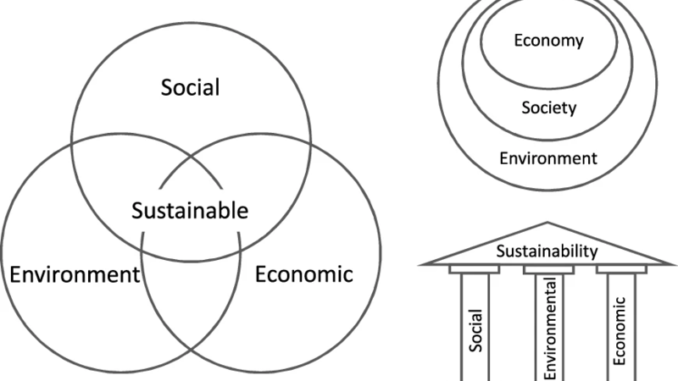
In today’s world, the need for sustainable practices and environmental awareness has become more crucial than ever. The rapid depletion of natural resources, the escalating impacts of climate change, and the degradation of ecosystems demand urgent action. Education for sustainability plays a pivotal role in empowering individuals and communities to bring about positive change. By fostering environmental awareness and providing the necessary knowledge and skills, education can empower individuals to make informed decisions and take actions that contribute to a more sustainable future. On a worldwide scale, there has been significant work over the last ten years to achieve sustainable development. The current world is less ecologically sustainable than in earlier times, despite holding more conferences, seminars, and global summits to safeguard the environment. The fact that the affluent industrialized nations seemed to be quite satisfied with the progress they had made, whilst the poor emerging countries had been severely hampered by a lack of financial and qualified labor resources, is highly expected. Whatever advancements rich nations have accomplished thus far have primarily been made possible by the transfer of their polluting manufacturing operations to underdeveloped, poorer nations.
Table of Contents
Raising Environmental Awareness
One of the primary goals of education for sustainability is to raise environmental awareness among individuals of all ages. This involves imparting knowledge about the interconnections between human activities and the environment. By understanding the consequences of their actions, individuals can make conscious choices to minimize their ecological footprint. Education can provide insights into pressing environmental issues such as climate change, biodiversity loss, pollution, and resource depletion. Through various educational platforms, including schools, universities, and community organizations, individuals can learn about the causes, impacts, and potential solutions to these challenges.
Building a Sense of Responsibility
Education for sustainability goes beyond simply spreading information. It aims to instill a sense of responsibility towards the environment and future generations. By highlighting the link between human well-being and environmental health, education can inspire individuals to act in ways that promote sustainability. This can involve encouraging sustainable consumption patterns, reducing waste, conserving energy and water, and adopting eco-friendly practices. Through education, individuals can recognize their role as active participants in creating a more sustainable world.
Critical Thinking and Problem-Solving
Education for sustainability equips individuals with the critical thinking skills necessary to analyze complex environmental issues. By examining different perspectives and evaluating evidence, individuals can develop a holistic understanding of sustainability challenges. This enables them to identify root causes, explore innovative solutions, and engage in problem-solving. Education provides the tools to think critically about the environmental, social, and economic dimensions of sustainability, enabling individuals to make informed decisions and contribute to sustainable development.
Promoting Collaboration and Partnerships
Addressing sustainability challenges requires collaboration and partnerships at various levels. Education for sustainability fosters a sense of collective responsibility and encourages individuals to work together towards common goals. By creating platforms for collaboration, such as sustainability-focused projects and initiatives, education can facilitate the sharing of ideas, knowledge, and best practices. Moreover, education can forge partnerships between educational institutions, governments, NGOs, and businesses to implement sustainable practices and initiatives on a larger scale.
Empowering Future Generations
Education for sustainability recognizes the importance of empowering future generations to become agents of change. By integrating sustainability principles into formal education curricula, students can develop the knowledge, skills, and attitudes necessary for sustainable living. Education systems need to incorporate interdisciplinary approaches that promote critical thinking, creativity, and problem-solving skills. By equipping young learners with a deep understanding of environmental issues, their interconnections, and potential solutions, education can empower them to take proactive roles in creating a sustainable future.
Differentiated concept of sustainable development
There isn’t a single operational definition for sustainable development at the moment. The reason for this is that no one indicator can be used to compare the relative progress achieved by various countries or regions towards sustainable development across time or at a specific point in time. The pursuit of sustainable development on a global scale has been hampered by this absence.
In practice, sustainable global development means
The adoption of lifestyles that are compatible with the planet’s ecological limits by those who are wealthier is necessary for sustainable global development, for instance, in how they utilize energy.
Therefore, its practical definition must be based on the decrease in affluent consumption of goods and services both within and between countries if the international community is at all serious about attaining even a moderate degree of global sustainable development. Such a definition will open the door to creating a straightforward and distinctive indicator to gauge sustainable development as well as an equal allocation of resources among states. To even approach a minimal level of sustainable development, output and consumption must be restrained, and deliberate efforts must be undertaken to control consumption through formal education. Therefore, its practical definition must be based on the decrease in affluent consumption of goods and services both within and between countries if the international community is at all serious about attaining even a moderate degree of global sustainable development. Such a definition will open the door to creating a straightforward and distinctive indicator to gauge sustainable development as well as an equal allocation of resources among states. To even approach a minimal level of sustainable development, output and consumption must be restrained, and deliberate efforts must be undertaken to control consumption through formal education.
Conclusion
Education for sustainability is a powerful tool in empowering individuals and communities to bring about positive change. By raising environmental awareness, building a sense of responsibility, fostering critical thinking, promoting collaboration, and empowering future generations, education plays a vital role in achieving a sustainable future. Educational institutions, governments, and communities must prioritize and invest in education for sustainability. Only through collective efforts and a strong commitment to environmental awareness can we ensure a healthier planet for present and future generations.

Leave a Reply